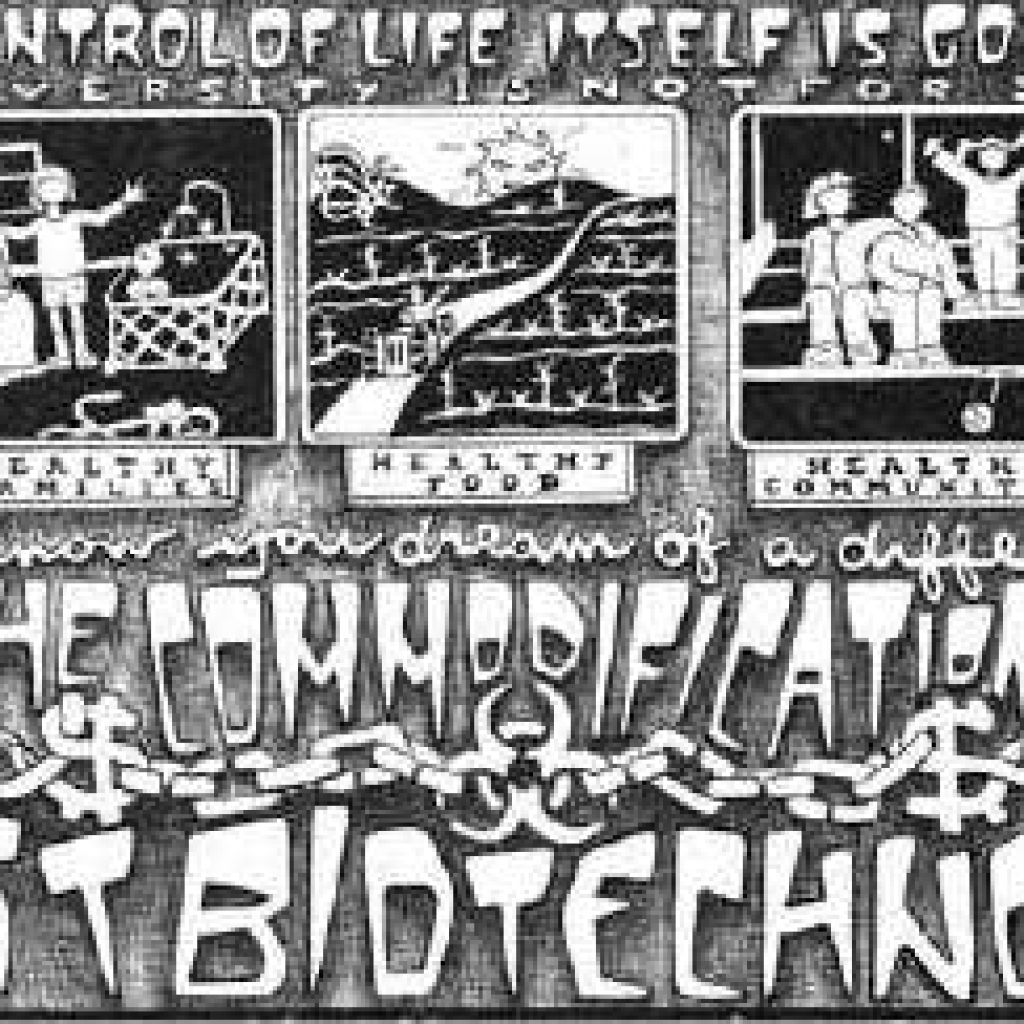Reclaim the Commons Teach-in Schedule
Thursday, June 3rd – Saturday, June 5th in San Francisco. Click ‘MORE’ for details!
2004: Come to San Francisco June 3rd – 9th

Dazzle the forces of corporate globalization with streets full of resistance and vision! While the biotechnology industry and its lobbyists meet in San Francisco and the G8 meets in Georgia, join us in San Francisco for a mass mobilization that says NO to corporate profiteering and destruction and YES to the world we want.
From Biodevastation to Reclaiming the Commons: A brief history
The Reclaiming the Commons mobilization in San Francisco continues a series of international grassroots gatherings on issues of genetic engineering, the patenting of life, and corporate dominance over our food and health that began six years ago in St. Louis. Since May of 1999, most of these gatherings have coincided with the annual convention of BIO, the Biotechnology Industry Organization.
Bite-Back Campaign: Tell Bush to go GM cold turkey this Thanksgiving (and beyond)

Nic Lee, Friends of the Earth representative for England, Wales & N. Ireland reports:
The US Government continues to pursue its complaint with the World Trade Organisation regarding the European Union’s policy on GM food. Friends of the Earth believes that it’s just the latest Bush government-led attempt to bulldoze over other countries’ rights to protect their people and the environment. Don’t let Bush tell you what to eat – Bite back! and send him a turkey as his thoughts turn to food this Thanksgiving:
Reclaiming the Commons, from The Corner House, UK
To Western eyes, the streets and lanes of Bangkok, like those of many cities in the South, may seem a strange mixture of order and chaos. In the shadow of high-rise hotels, apartment and office blocks, people live in dark, seemingly random collections of shacks near railway lines, on construction sites, and over swamps. In front of rows of concrete shophouses and air-conditioned banks, carts and stalls selling noodles, dried squid, curries and iced drinks jostle for kerb space with amulet sellers, fruit vendors and beggars. Souvenir merchants block pedestrian traffic by jamming their tables up against those of purveyors of cheap baby clothes, leather goods, sweets and dubious athletic shoes. Street corner vendors show open contempt for the solemnities of intellectual property by loudly inviting passers-by to invest in fake Rolex watches, pirated rock music cassettes and bogus Lacoste shirts. Under the eyes of bored traffic police, pedestrians jaywalk across roads congested with trucks, buses and motorcycles.
Reclaiming the Commons, Part 2
The creation of empires and states, business conglomerates and civic dictatorships — whether in pre-colonial times or in the modern era — has only been possible through dismantling the commons and harnessing the fragments, deprived of their old significance, to build up new economic and social patterns that are responsive to the interests of a dominant minority. The modern nation state has been built only by stripping power and control from commons regimes and creating structures of governance from which the great mass of humanity (particularly women) are excluded. Likewise, the market economy has expanded primarily by enabling state and commercial interests to gain control of territory that has traditionally been used and cherished by others, and by transforming that territory – together with the people themselves – into expendable “resources” for exploitation. By enclosing forests, the state and private enterprise have torn them out of fabrics of peasant subsistence; by providing local leaders with an outside power base, unaccountable to local people, they have undermined village checks and balances; by stimulating demand for cash goods, they have impelled villagers to seek an ever wider range of things to sell. Such a policy was as determinedly pursued by the courts of Aztec Mexico, the feudal lords of West Africa, and the factory owners of Lancashire and the British Rail as it is today by the International Monetary Fund or Coca-Cola Inc.
Reclaiming the Commons, Conclusion
It would be a mistake to see acts of resistance and reclamation solely as the province of those active in party politics, or of those whose “backs are against the wall”. On the contrary, resistance to enclosure takes place in countless everyday ways in both the south and the North. Acquiescent behaviour towards enclosers, and feigned ignorance or incompetence in their presence, allow individuals to retain their own sense of dignity by mocking the stereotypes that have been imposed upon them. As an Ethiopian proverb has it, “When the great lord passes, the wise peasant bows deeply and silently farts.”

